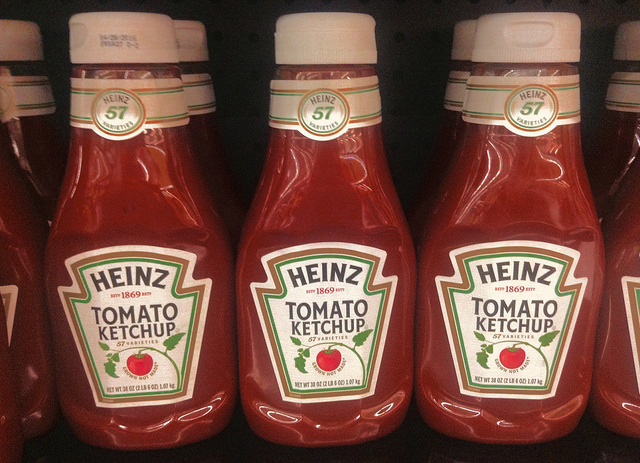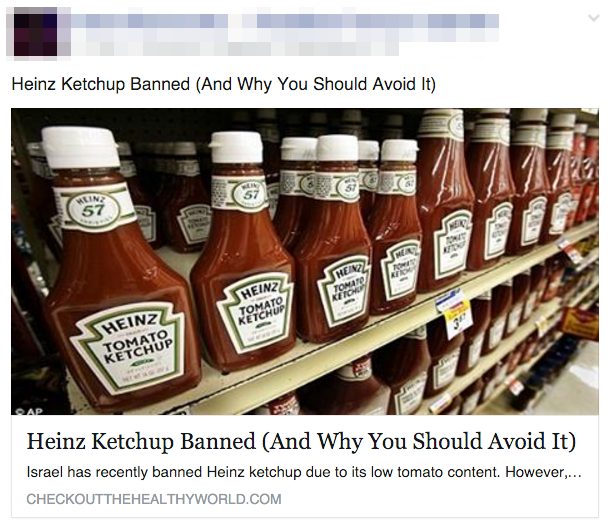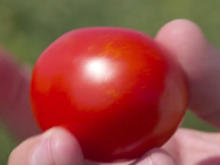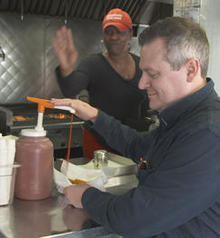
PHOTOGRAPH BY JASMINE WIGGINS
APRIL 21, 2014
How Was Ketchup Invented?
by Jasmine Wiggins
It is a dynamic red concoction. At once savory and sweet, with just the right amount of puckering twang, it is slathered and squirted onto our favorite foods.
Even the most barren of refrigerators has a lingering bottle that clatters with the whoosh of an opened door. It is the hero of American condiments: ketchup.
In the U.S., 97 percent of households report having a bottle at the table. How did a simple sauce come to be so loved by America? It turns out ketchup’s origins are anything but American. Ketchup comes from the Hokkien Chinese word, kê-tsiap, the name of a sauce derived from fermented fish. It is believed that traders brought fish sauce from Vietnam to southeastern China.
The British likely encountered ketchup in Southeast Asia, returned home, and tried to replicate the fermented dark sauce. This probably happened in the late 17th and early 18th centuries as evidenced by a recipe published in 1732 for “Ketchup in Paste,” by Richard Bradley, which referenced “Bencoulin in the East-Indies” as its origin. (See “How a Food Becomes Famous.”)
But this was certainly not the ketchup we would recognize today. Most British recipes called for ingredients like mushrooms, walnuts, oysters, or anchovies in an effort to reproduce the savory tastes first encountered in Asia. Mushroom ketchup was even a purported favorite of Jane Austen. These early ketchups were mostly thin and dark, and were often added to soups, sauces, meat and fish. At this point, ketchup lacked one important ingredient.
Enter the tomato. The first known published tomato ketchup recipe appeared in 1812, written by scientist and horticulturalist, James Mease, who referred to tomatoes as “love apples.” His recipe contained tomato pulp, spices, and brandy but lacked vinegar and sugar.
Ketchup’s success was due in part because it could be kept for up to a year. Still, preservation of tomato ketchups proved challenging. Since tomato-growing season was short, makers of ketchup had to solve the problem of preserving tomato pulp year round. Some producers handled and stored the product so poorly that the resulting sauce contained contaminants like bacteria, spores, yeast, and mold—leading French cookbook author Pierre Blot to call commercial ketchup “filthy, decomposed and putrid” in 1866.
Early investigations into commercial ketchup found that it contained potentially unsafe levels of preservatives, namely coal tar, which was sometimes added to achieve the a red color, and sodium benzoate, an additive that retarded spoilage. By the end of the 19th Century, benzoates were seen as particularly harmful to health. At the forefront of the war against them was one Dr. Harvey Washington Wiley, who maintained that the use of these harmful preservatives was unnecessary if high quality ingredients were used and handled properly. (See “Chemicals Within Us.”)
Wiley partnered with a Pittsburgh man named Henry J. Heinz who had started producing ketchup in 1876. Heinz was also convinced American consumers did not want chemicals in their ketchup. In answer to the benzoate controversy, Heinz developed a recipe that used ripe, red tomatoes—which have more of the natural preservative called pectin than the scraps other manufacturers used—and dramatically increased the amount of vinegar and to reduce risk of spoilage. Heinz began producing preservative-free ketchup, and soon dominated the market. In 1905, the company had sold five million bottles of ketchup.
With the rise of commercial ketchup, recipes for the condiment slowly vanished from cookbooks. Home cooks found that homemade ketchup just didn’t taste “right.” This is not surprising. Americans now purchase 10 billion ounces of ketchup annually, which translates to roughly three bottles per person per year. If you can buy something delicious off the shelf, why on Earth would you attempt to make it?

Photograph by Jasmine Wiggins
Why not?
Last year, during the final few, trailing days of summer, I was not quite done relishing tomatoes. I had twenty pounds of red fruit gleaming on my kitchen table. I canned most of them to use in sauces and soups for the winter, but I had an inkling to try something different. I started to think about ketchup as method of preservation just as Americans had considered the sauce in the 19th century.
My friends thought I was crazy when I told them I was making ketchup. “You can’t do that!” one said. The flavors, he went on, were impossible to reproduce. There was a reason everyone bought commercial ketchup, he insisted, because any attempt to prepare a homemade version was futile. Fortunately, I love a challenge.
One of the first recipes Henry Heinz used back in the day contained allspice, cloves, cayenne pepper, mace, and cinnamon. A second included pepper, ginger, mustard seed, celery salt, horseradish, and brown sugar. The recipe I tested includes similar ingredients. While I admit my end result tastes nothing like Heinz (that rich texture is hard to achieve), it is still quite delicious. More savory than sweet, it packs a bit of heat that mellows with time after canning.
Today, the world of condiments is metamorphosing with the rise of alternative and artisanal ketchups and the ever-increasing popularity of my personal favorite condiment, Sriracha. Despite ketchup’s nearness to our hearts and all-American reputation, it is not even number one-selling condiment in America. What is? Mayonnaise.

Photograph by Jasmine Wiggins
Ketchup
From: The Homemade Pantry: 101 Foods You can Stop Buying & Start Making by Alana Chernila.
Clarkson Potter/Publishers. Link
Makes 4 cups
2 tablespoons olive oil
1 cup diced onion (large)
5 garlic cloves, minced
6 pounds ripe tomatoes, peeled, seeded, and cored, or three 28-ounce cans tomatoes, drained
3 teaspoons kosher salt, plus additional to taste
1 tablespoon paprika
1 teaspoon ground cinnamon
1/4 teaspoon ground cloves
1 tablespoon celery salt
1/2 teaspoon ground cumin
1/2 teaspoon dry mustard
1 1/2 tablespoons chili powder, plus additional to taste
1/2 teaspoon ground pepper
1/4 cup apple cider vinegar
1/4 cup distilled white vinegar
1 tablespoon packed light brown sugar
1 tablespoon honey
1. Heat the olive oil in a large, heavy-bottomed pot over medium heat. Add the onion and cook until translucent, about 3 minutes. Add the garlic and cook for 1 minute, while stirring.
2. Add the tomatoes, salt, paprika, cinnamon, cloves, celery salt, cumin, dry mustard, chili powder, and ground pepper and simmer, covered, stirring occasionally, for 20 minutes.
3. Blend until smooth with an immersion blender or transfer the mixture to an upright blender in two batches and puree until smooth. If transferred, return the mixture to the pot.
4. Add vinegars, brown sugar, and honey. Cook over medium heat, uncovered, stirring often, until the ketchup thickens, about 30 minutes. Adjust salt, pepper, and chili powder to taste.








 Reply With Quote
Reply With Quote

















